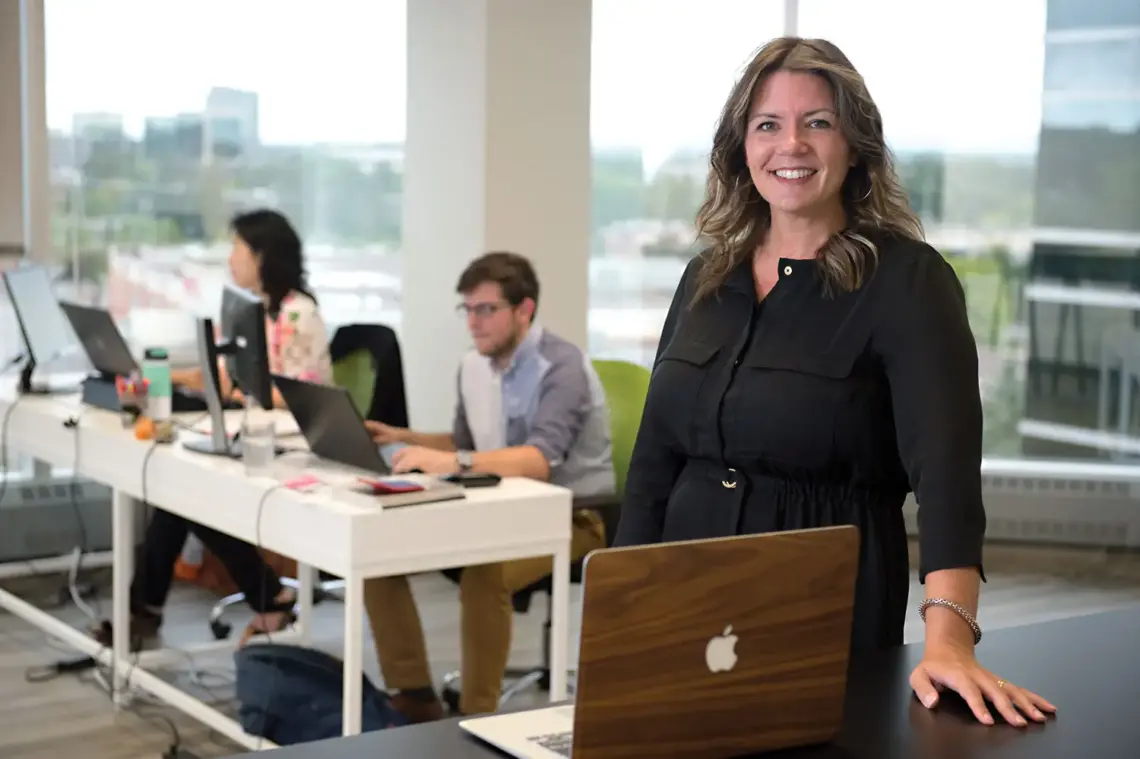
Susan Richards, the first female chair of Invest Ottawa, says female leaders have an opportunity to be examples to others. Photo by Mark Holleron
When Leah MacMillan started her career in technology 28 years ago at Corel, she says a strong female leader and mentor made all the difference when it came to fostering her career growth. Though she was in a male-dominated industry, she says having someone on her side meant the barriers faced by many women seemed diminished.
“Working in tech, women have always been outnumbered,” she says. “I was used to being the only woman at the table.”
Now, as the head of corporate marketing at Trend Micro, MacMillan wants to inspire the next generation of female leaders in technology, in part by playing the same role that her leader and mentor did for her.
“I feel that sharing my experiences (is) almost like my way of giving back,” she says.
That opportunity comes in many forms, including public forums where women share their experiences, such as panel discussions, networking events or other initiatives. There are currently more of these opportunities than ever, and leaders from the Kanata tech park are investing in and supporting such initiatives as Women in Technology or Technovation.
Last May, a standing-room-only crowd of more than 200 attendees filled L-Spark’s Kanata offices to hear the perspectives of other inspiring women entrepreneurs at Female Founders & Funders. L-Spark is also building the largest database of Canadian female founders, funders and the organizations that support them, all of which are publicly available online.
But personal, less formal connections are also still key for women in the industry, where women like MacMillan can help foster leadership, learn from each other, and continue to address diversity in technology.
Leah says that informal settings often provide an opportunity for making connections that can be hard to find in a male-dominated industry.
“It’s a way of just connecting people,” she says. “We use it as an opportunity to share.”
Thusha Agampodi of Magnet Forensics began organizing monthly lunches with other women in the tech park as a way of broadening the network of female leaders in the community.
“I just thought it would be good to have that other perspective,” she says. The first lunch, which MacMillan attended, was small – but the group has only grown since, attracting women from a variety of companies including BlackBerry and IBM.
The group is an informal way of networking and making connections that might not happen elsewhere, says Agampodi.
“They’re all really accomplished women, and I find our lunches are really inspiring,” she says.
The group is comprised of women from all levels of leadership, as well.
Arwa Kassamali has been in Kanata for four years, having moved from the U.S. She currently works at Abbott, and is involved in an initiative at her workplace to help engage girls in STEM careers.
She joined Thusha’s group as a way of broadening her network, learning about opportunities within the tech park, and making connections that might help her grow her career.
“You have to put yourself out there,” she says, adding that the informality of the group made it easier for her to connect with the other women.
Kassamali says it’s important to continue making time to foster those connections.
“Whether you’re just starting in your career or you’re 25 years in, you need to make the time to hear these stories,” she says. “When I do meet a woman executive who’s in the technical role, and they’re keeping up with it, it’s pretty impressive and often inspiring.”
For Susan Richards, the first female chair of Invest Ottawa, one of the most important changes she’s seeing is a slow rise in the number of female leaders at the executive level.
As more women rise to leadership roles in technology, Richards says they play an important role for other women with leadership goals.
“The leaders in our community … have an opportunity to be an example to others,” she says.
